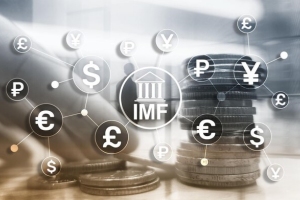What Is a Recession?
Hi! I’m Sandile from the IMF, and welcome back to the second episode of the Ask an Economist series, where we tackle your questions about thorny economic issues, breaking them down and giving you straight answers without all that fancy academic speak. Let’s get started!
So, thanks for sending in your questions. Today, we’re going to tackle questions around the theme of recessions. How does one determine whether a country is in a recession? What are the potential causes of a recession? And what are the impacts of recessions?
So what is a recession? Well, every economy goes through ups and downs. This cycle of rising and expanding and falling and contracting is called a business cycle. When these downturns are particularly long and severe, they can impact economic stability and people’s well-being. We call these recessions. Part of the reason that recessions are tricky to define is because there is no single definition of what a recession is. Countries around the world adopt different definitions. However, some economists use a very simple definition, where a recession is a decline in Gross Domestic Product for at least two consecutive quarters or six months.
Now, recall Gross Domestic Product, or GDP, is a measure of the size of an economy. It’s the total value of all goods and services produced by an economy.
Now, while this simple definition allows for international comparisons, it’s not perfect. And the reason that we have a little bit of pause is: One, GDP is just one single measure of the health of an economy. And number two, it can be subject to large revisions. And that’s why countries around the world use a multitude of different indicators. This includes personal income, unemployment, consumption. Broadly speaking, what we expect to see during recessions is falling incomes, rising unemployment, decreased factory production, and increased bankruptcies. That brings us to our second question: What are potential causes of a recession?
Now, part of what makes predicting recessions a little bit tricky is there can be several different drivers behind any given recession. That includes domestic factors coming from within one’s own country, as well as external factors from sources outside of one’s country. Let me give you a couple examples. On the external side, you can have supply shortages or slowdowns in the delivery of important goods like gas, or semiconductors that go into computers and cars. When this happens, economies are not able to produce or consume as much as they used to before.
Now, on the domestic side, you can have large and prolonged increases in risky borrowing and investments. So, this might mean that, for example, households are taking out mortgages that they’re struggling to pay off. In some cases, you might see many households, firms, and sometimes even governments unable to pay off their debts. This often trickles over to financial markets and then you see increasing concern from lenders not wanting to give out new loans. Now, we have a domino effect. Spilling over to wealth, investment, employment, and consumption.
Now, those were just two examples of what could cause a recession. There are many, many more, but we don’t have time for all of them today.
So let’s tackle your third question: What are the potential impacts of recessions?
Let’s start off with businesses. So during downturns, businesses often see falling sales, falling profits, and this leads them to delay or even reduce investment in hiring. What does that mean for workers? That means fewer jobs in the market, and probably lower wages. Now, even when somebody can find a job, sometimes it could be part-time, a bad fit, or lower paying. And we call that underemployment.
Now, the effect of recessions extends beyond workers. They can impact entire families. There’s less money around to spend on food, on education, on health care, impacting the entire family.
Now, finally, it’s important to note that the impact of recessions really differs across the population, with the poorest and most vulnerable often being the hardest hit. So what can governments do?
Well, the good thing is that they can do a lot to build resiliency and reduce the severity and length of recessions. For instance, they can adopt policies to reduce risky borrowing and investments. They can also introduce targeted social protection programs to buffer vulnerable populations during those downturns.
So that’s it for today’s episode. Please continue to send all of your questions to AskanEconomist@IMF.org and I’ll see you next time. Thank you.















